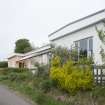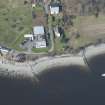Scheduled Maintenance
Please be advised that this website will undergo scheduled maintenance on the following dates: •
Tuesday 3rd December 11:00-15:00
During these times, some services may be temporarily unavailable. We apologise for any inconvenience this may cause.
Clyde Defences, Portkil Battery, Caretakers House
Guardhouse (First World War), House(S) (20th Century)
Site Name Clyde Defences, Portkil Battery, Caretakers House
Classification Guardhouse (First World War), House(S) (20th Century)
Alternative Name(s) Fort Road, Guardhouse
Canmore ID 331701
Site Number NS28SE 39.11
NGR NS 25259 80357
Datum OSGB36 - NGR
Permalink http://canmore.org.uk/site/331701
- Council Argyll And Bute
- Parish Rosneath
- Former Region Strathclyde
- Former District Dumbarton
- Former County Dunbartonshire
On the NE side of Fort Road is a flat roofed building noted on the 1908 plan as the Caretakers Quarters. The H-shaped building had a glass covered verandah to the front and a yard to rear. The yard has now been covered and is part of the building.
As planned the building was designed as two seperate houses, each a mirror image. However it was also to act as the guardhouse for the battery. This is clear in the plan of the building with rooms annotated with a domestic role and military roll. On the 1908 plan the two living rooms are also annotated as Guard Room. The corner rooms to rear are annotated 'Scullery or Cell' and the middle room on either wing is annotated 'Bed Room or Prisoners Room'.
The building is still extant and is now two semi-detached houses. The houses have replaced the roof.
Information from HS/RCAHMS World War One Audit Project (GJB) 5 July 2013.
Project (March 2013 - September 2013)
A project to characterise the quantity and quality of the Scottish resource of known surviving remains of the First World War. Carried out in partnership between Historic Scotland and RCAHMS.
Field Visit (28 September 2016)
This building, which is subdivided into two separate houses, the SE one unoccupied on the date of visit, appears to be as previously described and, notwithstanding the comparatively minor changes that have been made over the past one hundred years, are generally as depicted on a contemporary plan (National Archives: WO78/5184).
Visited by HES Survey and Recording (AKK) 28 September 2016.


















